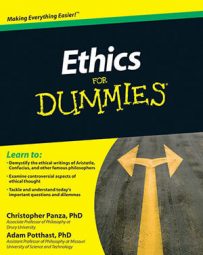-
Virtue ethics states that character matters above all else. Living an ethical life, or acting rightly, requires developing and demonstrating the virtues of courage, compassion, wisdom, and temperance. It also requires the avoidance of vices like greed, jealousy, and selfishness.
-
Utilitarianism holds that the amount of happiness and suffering created by a person’s actions is what really matters. Thus, acting rightly involves maximizing the amount of happiness and minimizing the amount of suffering around you. Sometimes you may even need to break some of the traditional moral rules to achieve such an outcome.
-
Kantianism emphasizes the principles behind actions rather than an action’s results. Acting rightly thus requires being motivated by proper universal principles that treat everyone with respect. When you’re motivated by the right principles, you overcome your animal instincts and act ethically.
-
Contract theory proposes thinking about ethics in terms of agreements between people. Doing the right thing means abiding by the agreements that the members of a rational society would choose. So for contract theorists, ethics isn’t necessarily about character, consequences, or principles.
-
Care ethics focuses ethical attention on relationships before other factors. As a result, acting rightly involves building, strengthening, and maintaining strong relationships. Acting rightly thus displays care for others and for the relationships of which they are a part. To care ethicists, relationships are fundamental to ethical thinking.

